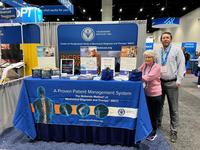News Room
Mentoring Makes a Difference in Lives, Treatment
The only way to learn is to teach. Denise Campbell can say that with confidence after more than 30 years as a student and teacher of physical therapy.
Through all her education, certification and professional experience, she'll tell you it's her mentors who made the difference.
"A mentor is someone who becomes actively and personally involved in your development," says Campbell, PT, ATC, Dip. MDT, OCS, FAAOMPT. "It's a closer kind of encouragement and leading that individual by opening doors."
A four-sport athlete in high school who went to college on a tennis scholarship, Campbell became interested in sports medicine after suffering a serious injury. Early in her physical therapy career, she worked closely with American Sports Medicine Institute Founder Dr. James Andrews and Dr. Jack Hughston, considered the "Father of Sports Medicine." This mentoring moment has impacted her entire career focused on being the physical therapist that top surgeons and patients want to work with.
"They were always challenging us," Campbell says. "They had high expectations and really inspired you to become that expectation."
Their guidance pushed her to succeed as a PT, but also advance her knowledge in perpetuity.
"Don't stop learning - My mentors just rooted that in me at a young age," says Campbell, who herself recently completed her master's degree in behavioral science. "As we get on, we get set in our ways and change becomes more difficult."
She made an important change in philosophy when she went to New Zealand to study with Robin McKenzie. The founder of the McKenzie Method® of Mechanical Diagnosis and Therapy® (MDT) proved to be her most influential mentor.
"[MDT is] in my DNA and our DNA as a practice," says Campbell, owner of Southwest Sport & Spine Center in Las Cruces, New Mexico. "McKenzie saved my career and made me an outstanding clinician that people want to see. It made my practice outstanding and something that people seek out."
The evidence-based MDT system begins with a thorough mechanical analysis to establish a "cause-and-effect" relationship between historical pain behavior as well as the response to repeated test movements, positions and activities.
A systematic progression of applied mechanical forces utilizes pain response to monitor changes in motion and function to classify the disorder. Clinicians then develop a plan of care that empowers patients to treat themselves when possible.
Campbell has been heavily involved with The McKenzie Institute® USA, mentoring some 35 MDT credential candidates. She hopes to make it 50.
"The only way you learn and master something is by teaching it," Campbell says. "I stand on the shoulders of giants and I tell people that you're going to stand on mine and do much greater things than I have done."
Mentoring is a must for practice owners, Campbell says.
"You feel overwhelmed as a practice owner trying to set a standard of care and run a practice," she says. "You'll get burned out and overwhelmed if you don't have people to replace you and move the practice ahead."
There are lots of ways to get started as a mentor: taking on interns, adjunct teaching or even guiding someone in your practice through postgraduate study like McKenzie certification. Practice owners, too, can benefit from mentors.
"Seek out a mentor, it will help your career exponentially," Campbell says. "And take that opportunity to pass it along yourself."
Share your news! Send your story to us and we'll post it for everyone to read.




